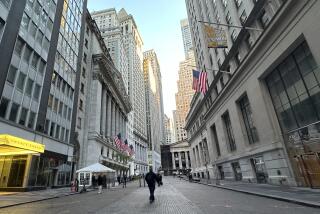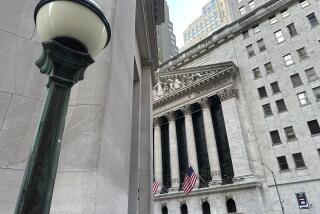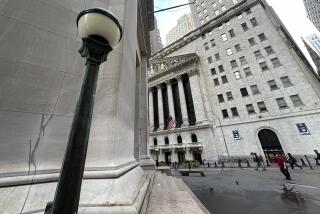Bond Yields Drop, Dow Up on GDP Report : Market Overview
Bond yields tumbled to near 16-year lows Thursday on news that the economy grew at a sluggish pace in the second quarter.
* Stocks climbed, carrying the Dow industrials up nearly 14 points to within a point of their all-time high, as interest rates plunged. Key foreign markets also surged.
* Gold futures neared a three-year high as investors, unnerved by European currency instability, sought safety in the metal. The dollar rocketed, gaining by default.
Credit
The bond market’s 1993 rally, which stalled last week, resumed with a vengeance as interest rates plummeted across the board.
The yield on the Treasury’s key 30-year bond sank to 6.57% from 6.65% Wednesday. Thursday’s yield was just slightly above the 6.54% set July 19--the lowest since the Treasury began regularly auctioning 30-year bonds in 1977.
Investors flocked to bonds after the Commerce Department reported that the U.S. economy grew at a disappointingly modest 1.6% annual rate in the second quarter.
That fell far short of the 2.3% rate predicted by private economists and the 2.5% to 3% rate forecast by Federal Reserve Chairman Alan Greenspan.
Bond investors also were cheered by a 2.6% annualized increase in a measure of inflation tied to the GDP. The meager second-quarter rise was less than the 4.3% rate increase in the first quarter.
Analysts said investors are more convinced than ever that there is no justification for a rise in interest rates anytime soon, given the weak economy. Thus, many investors are eager to lock in current yields.
Another catalyst for Thursday’s bond rally was a Washington Post story that said some Federal Reserve officials had not ruled out another official cut in interest rates as a way to stimulate economic growth, if needed.
Just last week, Greenspan had warned that investors must prepare for higher, not lower, rates. Thursday’s GDP report suggested otherwise, many bond traders said.
Stocks
The drop in interest rates helped buoy Wall Street, even though the GDP report implied disappointing future corporate profit growth if the economy can’t get rolling.
After trading at record heights for much of the day, the Dow industrials ended with a gain of 13.97 points at 3,567.42, just shy of the record 3,567.70 set Monday.
In the broad market, advancing issues outnumbered declines on the New York Stock Exchange by about 12 to 7, on volume of 266.55 million shares.
U.S. stocks were helped by gains overseas. In Tokyo, the Nikkei average shot up 627.27 points to 20,456.85 on the selection of the likely prime minister in a new coalition government that is expected to favor a tax cut.
In London, the FTSE-100 index jumped 33.4 points to 2,917.6, even though a cut in German interest rates was disappointingly small. In Frankfurt, the DAX average ended down 0.21 point at 1,833.70.
Among U.S. market highlights:
* Positive earnings surprises from some blue-chip companies helped drive the market. Among the winners were GM, up 1/2 to 47 1/2; Allied-Signal, up 2 1/2 to 71 3/8; Eastman Kodak, up 1 1/2 to 53 7/8; and ITT Corp., up 1 3/8 to 88 3/4.
* Many financial stocks rose as interest rates fell. General Reinsurance soared 5 3/8 to 124 1/8, American International added 3 to 137 7/8, Citicorp gained 1/2 to 33 1/4 and Nationsbank surged 1 3/8 to 50 5/8.
Also, mutual fund firm T. Rowe Price jumped 4 to 54 after reporting second-quarter earnings.
Other Markets
Gold prices surged after the German central bank opted for a minimum interest rate cut, which further riled European currency markets and sent traders hunting for safe havens.
On New York’s Comex, gold for current delivery settled at $397.80 an ounce, up $4.40. Silver closed at $5.20 an ounce, up 5 cents.
Gold futures traded as high as $404 late in the session during an avalanche of buying in the face of few willing sellers. Prices fell back near the close.
The last time gold closed over $400 was at the start of the Gulf War in January, 1991.
The German decision raised pressure on France and other states to pull out of the European exchange system, which is being fractured by Germany’s high-interest-rate policy.
Worries about currency markets also boosted the U.S. dollar by default.
In New York, the dollar jumped to 106.45 Japanese yen and 1.741 German marks, up from 105.80 yen and 1.717 marks Wednesday.
Market Roundup, D6
More to Read
Inside the business of entertainment
The Wide Shot brings you news, analysis and insights on everything from streaming wars to production — and what it all means for the future.
You may occasionally receive promotional content from the Los Angeles Times.










